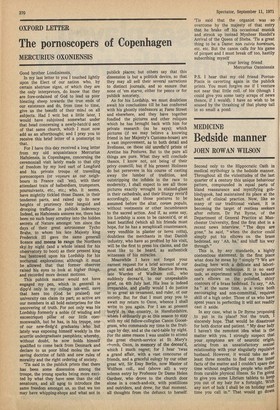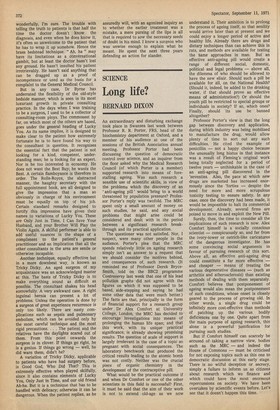MEDICINE
Bedside manner
JOHN ROWAN WILSON
Second only to the Hippocratic Oath in medical mythology is the bedside manner.
Throughout all the vicissitudes of the last quarter of a century this unique behaviour pattern, compounded in equal parts of bland reassurance and mystifying gob bledygook, had maintained its place at the heart of clinical practice. Now, like so many of our traditional values, it is becoming the target of restless seekers after reform. Dr Pat Byrne, of the Department of General Practice at Manchester University, fired the first shot in a recent news interview. "The days are gone," he said, "when the doctor could simply put his elbows on the brass bedstead, say ' Ah, ha,' and bluff his way through."
This is, by any standards, a highly contentious statement. In the first place what does he mean by "simply "? We are dealing here with a delicate and laboriously acquired technique. It is no easy task, as experiment will show, to balance
one's elbows on the polished, shiny contours of a brass bedstead. To say, " Ah,
ha" at the same time, in a voice both encouraging and non-committal, requires skill of a high order. Those of us who have spent years in perfecting it will not readily cast it aside.
In any case, what is Dr Byrne proposing to put in its place? Not the truth, sincerely hope. That would be disastrous for both doctor and patient. "My dear lady I haven't the remotest idea what is the matter with you. I strongly suspect that your symptoms are of neurotic origin, arising from an unsatisfactory sexual relationship with your singularly repulsive husband. However, it would take me at least three months to find out the inner facts of the matter and I couldn't spare the time without neglecting people who suffer from curable physical illness. So I'm going to give you some Librium tablets to keep you out of my hair for a fortnight. With any sort of luck I shall be on holiday next time you call in." That would go dovvn wonderfully, I'm sure. The trouble with telling the truth to patients is that half the time the doctor doesn't know the diagnosis, and even when he does know it, it's often so unwelcome to the patient that he has to wrap it up somehow. Hence the brass bedstead technique. " Ah, ha " may have its limitations as a conversational gambit, but at least the doctor hasn't lost any ground. He hasn't insulted his patient irretrievably. He hasn't said anything that can be dragged up as a proof of incompetence or used as the basis for a complaint to the General Medical Council.
But in any case, Dr Byrne has underrated the flexibility of the old-style bedside manner, which is seen in its most luxuriant growth in private consulting practice. In the days when I was training to be a surgeon., I used to be a collector of consulting-room ploys. The commonest by far, on which most of the others are based, goes under the general heading of Lucky You. As its name implies, it is designed to make clear to the patient how extremely fortunate he is to have found his way to the consultant in question. It recognises the essential fact that the patient is not looking for a kind, competent, understanding man; he is looking for an expert. Nor is he too interested in economy. He does not want the Best Buy; he wants the Best. A certain flamboyance is therefore in order. The Rolls-Royce, the abstracted manner, the haughty secretary with the full appointment book, are all designed to give the impression that a man so obviously in charge of his environment must be equally on top of his job. Certain standard remarks designed to fortify this impression have given their names to variations of Lucky You. These are Only Just in Time, I Can Save Your Husband, and your Brother Will Play the Violin Again. A skilful performer is able to add useful nuances in the shape of a compliment to the patient's general practitioner and an implication that all the other consultants in the area are senile or otherwise incapable.
Another technique, equally effective but in a more downbeat way, is known as Tricky Dicky. An aged surgeon of my acquaintance was an acknowledged master at this. The basis of Tricky Dicky is to make everything sound as difficult as possible. The consultant shakes his head sorrowfully. A very awkward case. A right inguinal hernia can present a lot of problems. Unless the operation is done by a surgeon of great experience recurrence is only too likely. There are nasty complications such as sepsis and pulmonary embolism, which can be avoided only by the most careful technique and the most rigid precautions. . . . The patient and the relatives have the daylights scared out of them. From this point onwards the surgeon is in clover. If things go right, he is a genius. If things go wrong — well, he did warn them, didn't he?
A variation of Tricky Dicky, applicable to patients who have had surgery before, is Good God, Who Did That? This is extremely effective when played skilfully, since it also contains elements of Lucky You, Only Just In Time, and our old friend Ah-ha. But it is a technique that has to be handled with delicacy; otherwise it can be dangerous. When the patient replies, as he assuredly will, with an agonized inquiry as to whether the earlier treatment was a mistake, a mere pursing of the lips is all that is required to sow the necessary seeds of doubt in his mind. I knew a surgeon who was unwise enough to explain what he meant. He spent the next three years defending an action for slander.











































 Previous page
Previous page